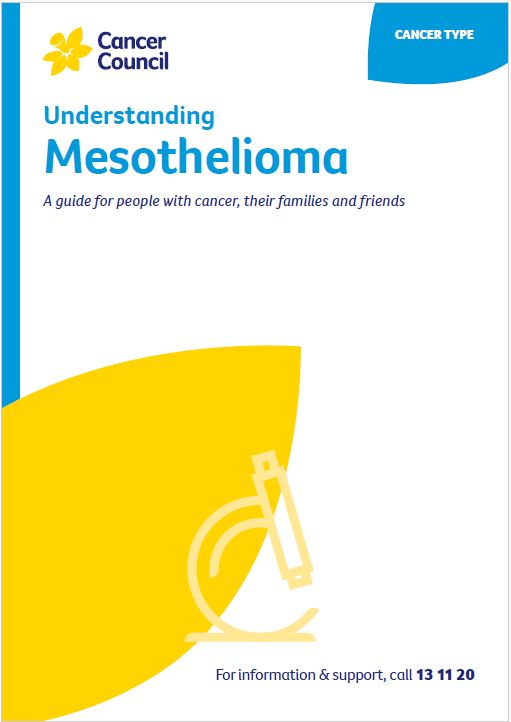- Home
- Peritoneal mesothelioma
- Symptoms
Peritoneal mesothelioma symptoms
The first signs of peritoneal mesothelioma are often vague and similar to other conditions. If you are concerned, see your general practitioner (GP). It can take time to be diagnosed, as the symptoms may come and go, and more common conditions are often investigated first. Let your GP know if you think you have been exposed to asbestos in the past. Finding mesothelioma early may mean more treatment options are available to you.
Peritoneal mesothelioma may cause the following symptoms:
- abdominal pain
- a swollen abdomen
- poor appetite, nausea and vomiting
- unexplained increase in fatigue and low energy
- night sweats or fever
- bowel or urinary problems.
For an overview of what to expect at every stage of your pleural mesothelioma cancer care, visit Pleural mesothelioma: Your guide to best cancer care. This is a short guide to what is recommended, from diagnosis to treatment and beyond.
→ READ MORE: Peritoneal mesothelioma diagnosis
Dr Anthony Linton, Medical Oncologist, Concord Cancer Centre and Concord Repatriation General Hospital, NSW; Dr Naveed Alam, Thoracic Surgeon, St Vincent’s Hospital Melbourne and Monash Medical Centre, VIC; Donatella Arnoldo, Consumer; Polly Baldwin, 13 11 20 Consultant, Cancer Council SA; Dr Melvin (Wee Loong) Chin, Medical Oncologist, Sir Charles Gairdner Hospital and National Centre for Asbestos Related Diseases, WA; Prof Kwun Fong, Thoracic and Sleep Physician and Director, UQ Thoracic Research Centre, The Prince Charles Hospital, and Professor of Medicine, The University of Queensland, QLD; Vicki Hamilton OAM, Consumer and CEO, Asbestos Council of Victoria/GARDS Inc., VIC; Dr Susan Harden, Radiation Oncologist, Peter MacCallum Cancer Centre, VIC; Penny Jacomos, Social Worker, Asbestos Diseases Society of South Australia, SA; Prof Brian Le, Director, Parkville Integrated Palliative Care Service, The Royal Melbourne Hospital and Peter MacCallum Cancer Centre, VIC; Lung Cancer Support Nurses, Lung Foundation Australia; Jocelyn McLean, Mesothelioma Support Coordinator, Asbestos Diseases Research Institute, NSW; Prof David Morris, Peritonectomy Surgeon, St George Hospital and UNSW, NSW; Joanne Oates, Registered Occupational Therapist, Expert Witness in Dust Diseases, and Director, Evaluate, NSW; Chris Sheppard and Adam Barlow, RMB Lawyers.
View the Cancer Council NSW editorial policy.
View all publications or call 13 11 20 for free printed copies.
Need to talk?
Support services
Coping with cancer?
Speak to a qualified health professional someone who has been there, support groups & forum
Looking for transport, accommodation or home help?
Practical advice and support during and after treatment
Cancer information
Pleural mesothelioma
Learn about this type of mesothelioma, its symptoms, diagnosis, treatment, and how to manage its symptoms
Explore our resource hub
Explore and download our booklets, fact sheets, podcasts, webinars and videos for people affected by cancer
